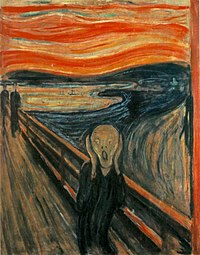
Evaluating the Interactive Effect of COVID-19 Worry and Loneliness on Mental Health Among Young Adults
Sign Up to like & getrecommendations! Published in 2021 at "Cognitive Therapy and Research"
DOI: 10.1007/s10608-021-10252-2
Abstract: Young adults are overrepresented in terms of adverse mental health problems related to COVID-19. Emerging work has identified worry about the consequences and trajectory of COVID-19 and loneliness as important factors in mental health during… read more here.
Keywords: worry; among young; covid; health ... See more keywords

The Contribution of Worry Behaviors to the Diagnosis of Generalized Anxiety Disorder
Sign Up to like & getrecommendations! Published in 2018 at "Journal of Psychopathology and Behavioral Assessment"
DOI: 10.1007/s10862-018-9683-5
Abstract: Worry behaviors (i.e., overt acts to avoid or cope with worry-induced distress) have been recognized as being important in the psychopathology and treatment of generalized anxiety disorder (GAD). This study evaluated the worry behaviors criterion… read more here.
Keywords: worry; gad; behaviors criterion; worry behaviors ... See more keywords

Colon Cancer Worry in Appalachia
Sign Up to like & getrecommendations! Published in 2017 at "Journal of Community Health"
DOI: 10.1007/s10900-017-0390-z
Abstract: Appalachia has a higher incidence of and mortality from colon cancer (CC) than other regions of the United States; thus, it is important to know the potential impact of elevated risk on cancer worry. Guided… read more here.
Keywords: worry; colon cancer; cancer worry; cancer ... See more keywords

Mind the “worry fatigue” amid Omicron scares
Sign Up to like & getrecommendations! Published in 2021 at "Brain, Behavior, and Immunity"
DOI: 10.1016/j.bbi.2021.12.023
Abstract: In addition to worry, the accumulated unknowns and uncertainties about COVID-19 may also result in “worry fatigue” that could harm the public’s vigilance towards the pandemic and their adherence to preventive measures. Worry could be… read more here.
Keywords: worry; worry fatigue; mind worry; fatigue amid ... See more keywords

Baseline Client Interpersonal Agency Moderates the Indirect Effect of Treatment on Long-term Worry in Variants of CBT for Generalized Anxiety Disorder.
Sign Up to like & getrecommendations! Published in 2019 at "Behavior therapy"
DOI: 10.1016/j.beth.2019.01.007
Abstract: In a recent trial for generalized anxiety disorder (GAD), cognitive-behavioral therapy (CBT) integrated with motivational interviewing (MI) promoted more long-term worry reduction than CBT alone (Westra, Constantino, & Antony, 2016). A follow-up analysis found that… read more here.
Keywords: treatment; long term; agency; cbt ... See more keywords

Does a novel training in mental imagery reduce pathological worry?
Sign Up to like & getrecommendations! Published in 2018 at "Behaviour research and therapy"
DOI: 10.1016/j.brat.2018.07.005
Abstract: Worry is a verbal and abstract thought activity with only little mental imagery involved. It has been shown that this processing bias leads to hampered emotional processing of worry topics so that worry is maintained… read more here.
Keywords: mental imagery; worry; training mental; pathological worry ... See more keywords

Worry as a mediator between psychosocial stressors and emotional sequelae: Moderation by contrast avoidance.
Sign Up to like & getrecommendations! Published in 2020 at "Journal of affective disorders"
DOI: 10.1016/j.jad.2020.01.092
Abstract: BACKGROUND Worry is the core feature of generalized anxiety disorder (GAD), which is prevalent among emerging adults. The contrast avoidance model proposes that individuals with GAD use worry to avoid negative emotional contrasts by maintaining… read more here.
Keywords: worry; anxiety; academic stressors; contrast avoidance ... See more keywords

Intolerance of uncertainty mediates the relationship between adult attachment and worry
Sign Up to like & getrecommendations! Published in 2017 at "Personality and Individual Differences"
DOI: 10.1016/j.paid.2017.02.039
Abstract: Abstract Background Attachment anxiety and avoidance have been found to be associated with worry. A substantial body of research suggests that intolerance of uncertainty (IOU) is a phenomenon which predicts level of worry, yet the… read more here.
Keywords: relationship; attachment; intolerance uncertainty; worry ... See more keywords

Is attendance at an ovarian cancer screening clinic a worry-reducing event? Findings from pre- to post-screening.
Sign Up to like & getrecommendations! Published in 2017 at "Gynecologic oncology"
DOI: 10.1016/j.ygyno.2016.11.047
Abstract: OBJECTIVE Many studies have examined the relationship between worry and cancer screening. Due to methodological inconsistencies, results of these studies have varied and few conclusions can be made when generalizing across studies. The purpose of… read more here.
Keywords: post screening; worry; cancer screening; ovarian cancer ... See more keywords

Targeting excessive worry with internet-based extinction therapy: a randomised controlled trial with mediation analysis and economical evaluation
Sign Up to like & getrecommendations! Published in 2020 at "Psychological Medicine"
DOI: 10.1017/s0033291720000781
Abstract: Abstract Background Excessive worry is a common phenomenon. Our research group has previously developed an online intervention for excessive worry based on operant principles of extinction (IbET; internet-based extinction therapy) and tested it against a… read more here.
Keywords: economical evaluation; excessive worry; worry; ctrl ... See more keywords

"Why Isn't It Going Away?": A Qualitative Exploration of Worry and Pain Experiences in Adolescents with Chronic Pain.
Sign Up to like & getrecommendations! Published in 2020 at "Pain medicine"
DOI: 10.1093/pm/pnaa245
Abstract: INTRODUCTION The role of cognition is central to the fear avoidance (FA) model of chronic pain (CP), which emphasizes the importance of catastrophic pain interpretations and has been shown to be applicable to pediatric CP… read more here.
Keywords: worry pain; worry; pain; away qualitative ... See more keywords